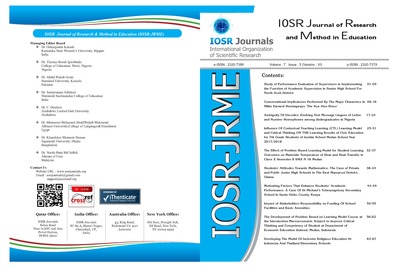NA'IMAH, - and SUKIMAN, - and Nurdin, Indra Fajar (2017) Developing The Model Of Inclusive Religious Education At Indonesia And Thailand Elementary Schools. IOSR Journal of Research & Method in Education (IOSR-JRME), Vol. 7 (No. 5). pp. 63-67. ISSN 2320–7388
![[img]](https://digilib.uin-suka.ac.id/28606/1.hassmallThumbnailVersion/Cover%20IOSR%20Book%20Jrme-7%285%29%28VI%29_001.png)
|
Image
Cover IOSR Book Jrme-7(5)(VI)_001.png - Cover Image Download (340kB) | Preview |
|
|
Text
Naimah & Sukiman - Developing The Model Of Inclusive Religious Education At.pdf - Published Version Download (897kB) | Preview |
Abstract
Indonesia and Thailand are a portrait of a country that has a diversity in many ways a complete and varied. The two countries are multicultural countries with diverse of ethnicity, race, religion and class. Ethnic diversity or ethnicity, religion, race, and class (SARA) both in Indonesia and in Thailand is the incredible potential that shows the wealth of the two people. The religious diversity of the citizens will be additional power for the common good in both countries if it is properly managed. But the fact of diversity in both countries during this precisely often a source of conflict and violence in particular that based on religious fanaticism. The conflict and violence in the name of religion are also caused partly by the lack of inclusiveness and multicultural understanding besides superficial, erroneous, and religious attitudes. Religious education is expected to be a means to instill an inclusive attitude and values of multiculturalism and understanding of the religious right for children. But the reality in the field of religious education in schools rated yet managed to portray a function to create values of inclusiveness to the students. One is the religious attitude of teachers still regard his religion most right while other religions wrong and also teachers who are still awkward to interact with people of different religions. But in the context of a multicultural society, the teachers have to realize that mutual respect is important to do for peace in society. Secondly, in the context of learning, the teacher has to have an understanding that mutual respect is important also built for the students, but do not yet have approaches and learning strategies appropriate and adequate to carry out learning based on the values of inclusiveness. Therefore, the religious teachers need an Inclusive Religious Educational Model that relevant to both in the learning process in the classroom and in everyday life at school. Third, this study has been able to formulate models for Inclusive Religious Education through two approaches, namely: Inclusive Education Approach to Teacher of Religion and Education inclusiveness-based on culture by teacher to student. Inclusive education approach to the Teacher in the form of substantive modules that the contents refers to intersubjective working procedure by Amin Abdullah as the basis for determining the value target and formulating the basic competence and indicator. While the Inclusive Educational approach of Teacher to the Student refers to the Lickona’s theories on the development of school culture that covers for six elements, namely: (1) leadership and exemplary moral, (2) the discipline as a whole, (3) the growing sense of fraternity, (4) democratic atmosphere, (5) a harmonious cooperation, and (6) to agenda for special time in discussing the issues of character. Fourth, model validation conducted with the involvement of education experts in Indonesia and Japan in the form of a Forum Group Discussion (FGD). From the FGD activities is obtained many useful advice related to the basic theory of inclusive development model of religious education, design models, as well as the content of the developed model. The submission is then used as the basis of improvement on prototype models. After improving inclusive religious educational model for both for religious teachers and students then it is reliable to be tested in the field. Keyword: Inclusive, Religious Education, Elementary School
| Item Type: | Article |
|---|---|
| Uncontrolled Keywords: | Inclusive, Religious Education, Elementary School |
| Subjects: | Pendidikan Islam (Pesantren) |
| Divisions: | Artikel (Terbitan Luar UIN) |
| Depositing User: | Sugeng Hariyanto, SIP (sugeng.hariyanto@uin-suka.ac.id) |
| Date Deposited: | 12 Dec 2017 08:44 |
| Last Modified: | 12 Dec 2017 08:45 |
| URI: | http://digilib.uin-suka.ac.id/id/eprint/28606 |
Share this knowledge with your friends :
Actions (login required)
 |
View Item |


